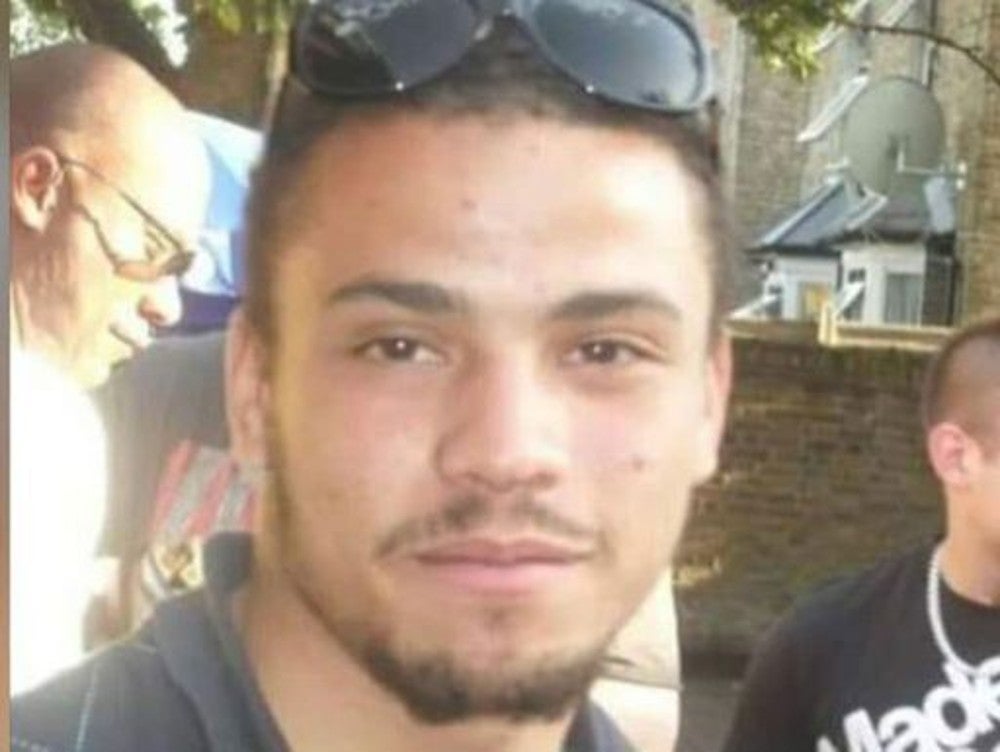Jermaine Baker: Fatal police shooting of unarmed black man ‘lawful’ despite 24 failings, inquiry finds
Retired judge says findings should be a ‘wale-up call’ for the next comissioner of the Metropolitan Police

An unarmed black man was shot dead after a “catalogue of failings” in a Metropolitan Police operation, an inquiry has found.
Retired judge Clement Goldstone QC concluded that Jermaine Baker, 28, was lawfully killed despite the errors.
But he warned that the findings should “serve as a loud wake-up call to a newly appointed commissioner” of Britain’s largest police force.
“I cannot help but believe and observe that if JB had not been fatally shot, none of the shortcomings in planning and execution which this inquiry has exposed would have come to light and the operation would have been hailed as an outstanding success by and for the Met,” the inquiry chair added.
Mr Baker was shot dead by an armed police officer during an attempt to break a London gangster out of prison on 11 December 2015.
His family have long battled for justice over the shooting, challenging the Crown Prosecution Service’s decision not to charge the officer who killed him and unsuccessfully taking Scotland Yard to court over their decision to let a commanding officer retire before potential misconduct proceedings.
Mr Baker’s mother, Margeret Smith, told the inquiry that he was “no angel”, saying her son was “involved in a crime and should have gone to prison like the others involved” - but should not have died.
She said her son’s experience was “the story of being written off as a child could be told about so many Black boys and young men”.
Mr Goldstone concluded that race “played no part in Mr Baker’s death” and that some of the officers at the scene thought he was of Turkish origin.
The plan was to intercept a custody van carrying Izzet Eren, a member of the Tottenham Turks gang, as he was transported to Wood Green Crown Court to be sentenced for possessing a Skorpion sub-machine gun with intent to danger life.
The conspirators used a stolen Audi, but it was bugged by the police and then targeted by an armed “extraction” operation to arrest those inside.
Mr Baker was sat in the car, parked in a residential street near the back of the court, with two other men when counter-terrrorism specialist firearms officers (CTSFOs) were ordered to move in.
The inquiry’s findings said: “Mr Baker was not carrying a weapon. The Audi was later searched and an imitation firearm, in the style of a black Uzi sub-machine gun, was found in the rear of the car.”

Earlier in the day, Detective Chief Inspector Neil Williams, the operations’ tactical firearms commander, had been told that the conspirators had only been able to source an imitation gun rather than a live weapon.
But he did not pass the information onto other officers, or the CTSFOs who were to carry out the extraction.
The officer who shot Mr Baker, known as W80, said that at the time of the operation he believed there was going to be an attack “by a group of experienced and dangerous individuals who would be armed and would use firearms in the course of the offence … I believed that the suspects would be armed with weapons, possibly machine pistols.”
He told the inquiry that he went to the Audi’s passenger side and opened the door with the intention to extract Mr Baker himself or provided cover for a colleague while they did.
But another parked car meant that the open door created a barrier between Mr Baker and W80 and the suspect could not be dragged out or physically restrained.
Mr Goldstone said W80 had no Taser situation meant that he had the choice between verbal commands or his gun.
The officer said he told Mr Baker to put his hands on the dashboard, but a transcript of the incident shows that other armed police were shouting “get your hands up”.
W80 shot Mr Baker as his hands rose towards a cross-body bag high on his chest.
Asked if the movement was “consistent with him putting up his hands in an indication of surrender”, W80 said he did not hear his fellow officers shouting for the car’s occupants to raise their hands and added: “I couldn’t wait for his hands to reach the bag…I was sure that there was a gun in the bag.”
He fired once, hitting Mr Baker in the neck. He received medical attention but was pronounced dead at the scene.
Mr Goldstone concluded that the killing was lawful because W80 “held an honest and genuine belief that Mr Baker was moving in order to reach for a firearm” and posed a lethal threat.
“W80 was entitled to believe the occupants of the car were armed with at least one firearm, no one had ever said anything to disabuse him of that belief,” the inquiry chair added.
“W80 may have been tragically wrong in his belief but I am unable to conclude that it was not honestly held.”
The inquiry heard that W80 attempted suicide following the shooting, but Mr Goldstone said that did not mean he had a “guilty conscience” and said the officer had been involved in a traumatic incident.
He found 24 failings in the planning and execution of the operation, but said they fell short of a gross negligence by DCI Williams.
They include the failure to consider alternatives to an armed operation, including arresting Mr Baker and others for conspiracy over the prison break, or informing the prison service of the plan so they could put Izzet Eren in a different jail and under tighter security.
Mr Goldstone accused some officers of a “slapdash and unprofessional approach” to risk assessments and human rights considerations, and an “arrogant” attitude to record-keeping for accountability.
Scotland Yard refused to commence disciplinary proceedings against W80 for excessive force in 2018, sparking a legal battle with the Independent Office for Police Conduct that is yet to be heard at the Supreme Court.
DCI Williams announced his intention to retire before he was served with a notice of investigation by the watchdog.
W80 was allowed back to work after being suspended from duty without any formal occupational or other health assessment being taken, and without any disciplinary proceedings.
A spokesperson for the Metropolitan Police said: “Since Mr Baker’s death we have made changes to how our firearms command operates in London, including how operations are run and overseen, how we train and support officers involved and how we keep records.
“We are always open to improving our capability to tackle the threat of firearms. We will now take time to carefully study the inquiry’s recommendations before responding in more detail.”


